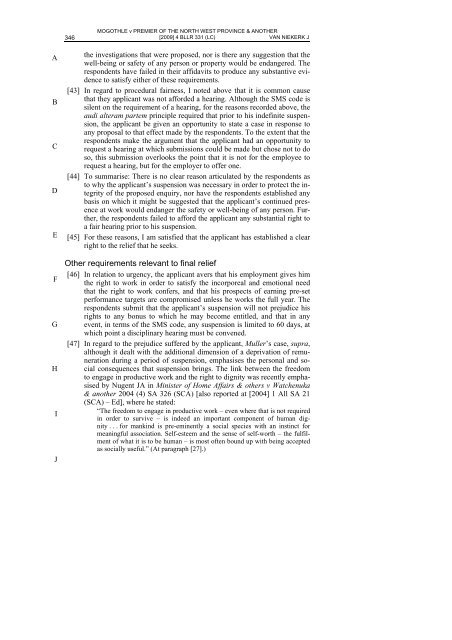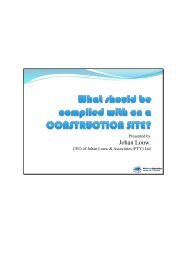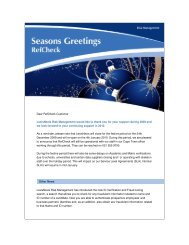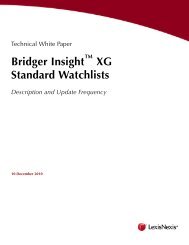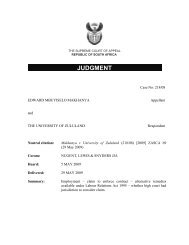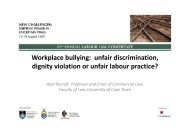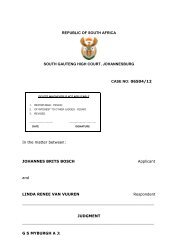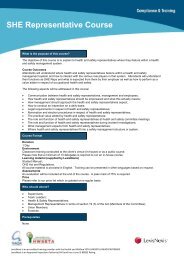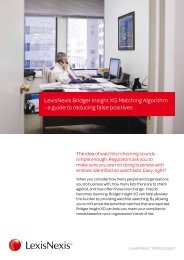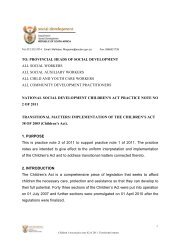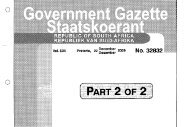Mogothle v Premier of the Northwest Province and others
Mogothle v Premier of the Northwest Province and others
Mogothle v Premier of the Northwest Province and others
Create successful ePaper yourself
Turn your PDF publications into a flip-book with our unique Google optimized e-Paper software.
MOGOTHLE v PREMIER OF THE NORTH WEST PROVINCE & ANOTHER346 [2009] 4 BLLR 331 (LC) VAN NIEKERK JABCDEFGHIJ<strong>the</strong> investigations that were proposed, nor is <strong>the</strong>re any suggestion that <strong>the</strong>well-being or safety <strong>of</strong> any person or property would be endangered. Therespondents have failed in <strong>the</strong>ir affidavits to produce any substantive evidenceto satisfy ei<strong>the</strong>r <strong>of</strong> <strong>the</strong>se requirements.[43] In regard to procedural fairness, I noted above that it is common causethat <strong>the</strong>y applicant was not afforded a hearing. Although <strong>the</strong> SMS code issilent on <strong>the</strong> requirement <strong>of</strong> a hearing, for <strong>the</strong> reasons recorded above, <strong>the</strong>audi alteram partem principle required that prior to his indefinite suspension,<strong>the</strong> applicant be given an opportunity to state a case in response toany proposal to that effect made by <strong>the</strong> respondents. To <strong>the</strong> extent that <strong>the</strong>respondents make <strong>the</strong> argument that <strong>the</strong> applicant had an opportunity torequest a hearing at which submissions could be made but chose not to doso, this submission overlooks <strong>the</strong> point that it is not for <strong>the</strong> employee torequest a hearing, but for <strong>the</strong> employer to <strong>of</strong>fer one.[44] To summarise: There is no clear reason articulated by <strong>the</strong> respondents asto why <strong>the</strong> applicant’s suspension was necessary in order to protect <strong>the</strong> integrity<strong>of</strong> <strong>the</strong> proposed enquiry, nor have <strong>the</strong> respondents established anybasis on which it might be suggested that <strong>the</strong> applicant’s continued presenceat work would endanger <strong>the</strong> safety or well-being <strong>of</strong> any person. Fur<strong>the</strong>r,<strong>the</strong> respondents failed to afford <strong>the</strong> applicant any substantial right toa fair hearing prior to his suspension.[45] For <strong>the</strong>se reasons, I am satisfied that <strong>the</strong> applicant has established a clearright to <strong>the</strong> relief that he seeks.O<strong>the</strong>r requirements relevant to final relief[46] In relation to urgency, <strong>the</strong> applicant avers that his employment gives him<strong>the</strong> right to work in order to satisfy <strong>the</strong> incorporeal <strong>and</strong> emotional needthat <strong>the</strong> right to work confers, <strong>and</strong> that his prospects <strong>of</strong> earning pre-setperformance targets are compromised unless he works <strong>the</strong> full year. Therespondents submit that <strong>the</strong> applicant’s suspension will not prejudice hisrights to any bonus to which he may become entitled, <strong>and</strong> that in anyevent, in terms <strong>of</strong> <strong>the</strong> SMS code, any suspension is limited to 60 days, atwhich point a disciplinary hearing must be convened.[47] In regard to <strong>the</strong> prejudice suffered by <strong>the</strong> applicant, Muller’s case, supra,although it dealt with <strong>the</strong> additional dimension <strong>of</strong> a deprivation <strong>of</strong> remunerationduring a period <strong>of</strong> suspension, emphasises <strong>the</strong> personal <strong>and</strong> socialconsequences that suspension brings. The link between <strong>the</strong> freedomto engage in productive work <strong>and</strong> <strong>the</strong> right to dignity was recently emphasisedby Nugent JA in Minister <strong>of</strong> Home Affairs & o<strong>the</strong>rs v Watchenuka& ano<strong>the</strong>r 2004 (4) SA 326 (SCA) [also reported at [2004] 1 All SA 21(SCA) – Ed], where he stated:“The freedom to engage in productive work – even where that is not requiredin order to survive – is indeed an important component <strong>of</strong> human dignity. . . for mankind is pre-eminently a social species with an instinct formeaningful association. Self-esteem <strong>and</strong> <strong>the</strong> sense <strong>of</strong> self-worth – <strong>the</strong> fulfilment<strong>of</strong> what it is to be human – is most <strong>of</strong>ten bound up with being acceptedas socially useful.” (At paragraph [27].)


